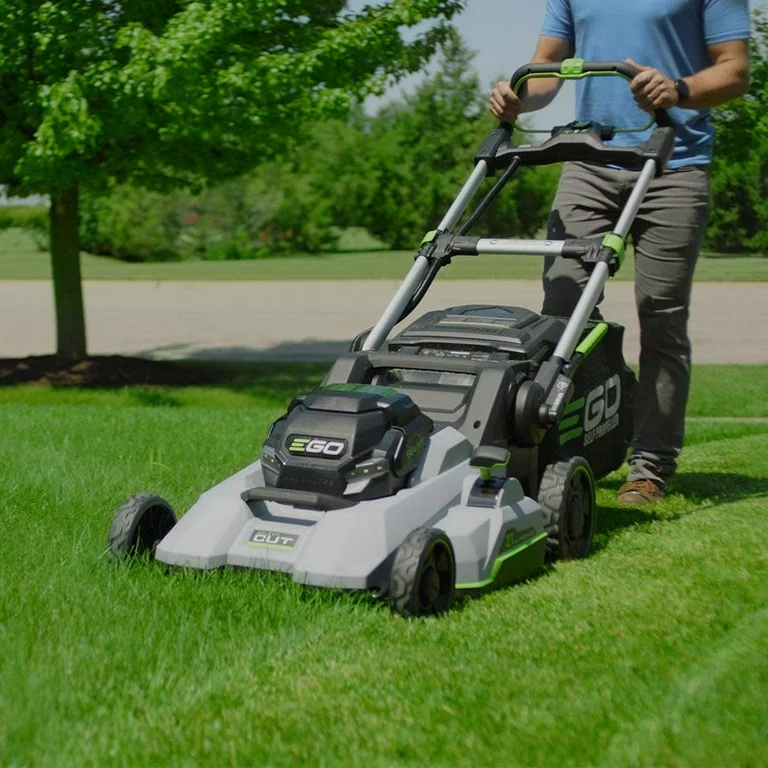
When it comes to keeping your lawn looking pristine, the choice between a battery lawn mower and a gas lawn mower can be a tough one. Both options have their own set of pros and cons that you’ll need to consider before making a decision. In this article, we’ll break down the key differences between battery and gas lawn mowers to help you make an informed choice for your lawn care needs.
The Basics of Battery Lawn Mowers

Battery lawn mowers represent a leap forward in lawn care technology, appealing to those seeking an eco-friendly alternative to traditional gas mowers. Powered by advanced lithium-ion batteries, these mowers are designed for convenience and efficiency. Without the need for gasoline or oil, users can avoid the mess and environmental impact associated with gas-powered models. The batteries are rechargeable, often with a quick charge time, allowing for multiple mows with proper planning and battery management.
One of the standout features of battery lawn mowers is their lightweight design. This makes them not only easier to maneuver around your yard but also simplifies storage and transport. Their operation is significantly quieter compared to gas mowers, reducing noise pollution and making them more neighbor-friendly during early morning or late evening mowing sessions.
However, it’s important to note the initial investment in a battery lawn mower can be higher than that of a gas model. The cost reflects the advanced technology and the convenience of a battery-powered system. Additionally, while these mowers eliminate the need for gasoline, they do depend on having a charged battery. This reliance means users with larger lawns might require multiple batteries to complete their mowing, which can add to the overall expense.
Despite these considerations, battery lawn mowers are an excellent choice for those prioritizing ease of use, environmental consciousness, and reduced maintenance. With no spark plugs to change, oil to check, or filters to replace, they offer a hassle-free lawn care option for homeowners looking to streamline their gardening tasks. As battery technology continues to evolve, these mowers are becoming an increasingly viable option for a wide range of lawn sizes and types.
Understanding Gas Lawn Mowers

Gas lawn mowers have long been the go-to choice for homeowners due to their robust performance and dependability. They excel in tackling dense, tough grass, making them suitable for a variety of lawn types and sizes. The immediate power and unlimited runtime offered by gas mowers are unmatched by their battery counterparts, allowing users to complete their lawn care tasks without the interruption of recharging.
While they are generally more economical at the point of purchase, gas mowers do come with the necessity for regular maintenance. This includes oil changes, air filter replacements, and ensuring the blades are sharp for an efficient cut. Furthermore, they operate using a combustion engine, which requires a consistent supply of gasoline. This aspect introduces the need for safe storage of flammable liquids, a consideration that might deter some users.
The operational noise and emissions generated by gas lawn mowers are notable. They produce a significant amount of noise, which could be a concern in residential areas with strict noise regulations or for individuals preferring a more serene mowing experience. Additionally, the emissions from gas engines contribute to air pollution, a factor increasingly leading homeowners to consider their environmental impact when selecting lawn care equipment.
Despite these considerations, the sheer power and efficiency of gas lawn mowers keep them in high demand. They offer a level of cutting strength and durability that is essential for those with extensive or challenging lawn care needs. For individuals prioritizing performance and who are willing to undertake the necessary maintenance, gas lawn mowers remain a compelling option.
Convenience and Maintenance Compared

Gas lawn mowers offer the undeniable benefit of continuous mowing without the interruption of recharging, a significant advantage for those with extensive mowing tasks. Their robustness and capability to handle dense, tough grass with ease make them an appealing option for homeowners with larger lawns. However, this comes with the commitment to more hands-on maintenance. Regular tune-ups, oil changes, and the safe storage of gasoline are necessities that cannot be overlooked, presenting a contrast to the low-maintenance needs of their battery-powered counterparts.
On the flip side, battery lawn mowers champion ease of maintenance and operation. Eliminating the need for oil changes, spark plug replacements, and the handling of gasoline, these mowers offer a user-friendly approach to lawn care. Their quiet operation and lighter weight add to their appeal, fostering a more pleasant mowing experience. Nevertheless, the convenience of a battery mower is counterbalanced by its reliance on battery life. With a finite runtime that necessitates mindful planning or potential battery swaps mid-task, users with larger spaces may find this limitation challenging.
The distinction in convenience and maintenance between gas and battery lawn mowers underscores a trade-off between operational readiness and ease of care. Gas mowers, with their readiness for prolonged use, cater to users who prioritize uninterrupted power and are prepared to engage in regular maintenance. Conversely, battery mowers attract those who value simplicity in operation and maintenance, albeit with the consideration of battery life management. Each type presents a unique approach to lawn care, reflecting the diverse needs and preferences of homeowners navigating the intricacies of lawn maintenance.
The Environmental Impact of Your Choice

When considering the environmental footprint of lawn mowers, it’s important to weigh the differences between battery and gas-powered models. Battery-powered lawn mowers are celebrated for their clean operation. They don’t emit harmful pollutants during use, which contrasts sharply with the carbon emissions produced by gas mowers. This difference is critical in today’s climate-aware society, where reducing individual carbon footprints is a growing concern.
Gas mowers contribute to air pollution through their exhaust emissions. These emissions include carbon monoxide, nitrogen oxides, and hydrocarbons, all of which have been identified as contributors to global warming and adverse health effects in humans. In contrast, battery mowers run on electricity, potentially sourced from renewable energy, thereby offering a more sustainable option for lawn care.
Another aspect to consider is the indirect environmental impact of both types of mowers. The production, transportation, and storage of gasoline involve a significant environmental cost, including the risk of spills and leaks that can contaminate soil and water. Battery production is not without its environmental impact, primarily related to mining for lithium and other metals. However, advancements in battery recycling and the shift towards greener battery production methods are helping to mitigate these impacts.
The use of battery-powered mowers aligns with broader efforts to transition to renewable energy and reduce dependency on fossil fuels. As battery technology advances, these mowers are becoming more efficient and capable of longer run times, further closing the gap in performance between battery and gas models.
In sum, the choice between battery and gas lawn mowers extends beyond personal convenience and lawn care needs; it also reflects a decision about the kind of environmental legacy one wants to leave. Opting for a battery lawn mower represents a step towards a more sustainable and pollution-free lawn care practice, aligning with the global movement towards reducing carbon emissions and protecting the environment for future generations.
Cost Considerations: Initial and Long-term

Delving into the financial aspect of choosing between a battery and gas lawn mower involves a nuanced understanding of both initial investment and ongoing expenses. Gas lawn mowers, with their lower upfront cost, offer an appealing entry point for many homeowners. This affordability facilitates access to a reliable means of lawn care without a significant initial outlay. However, this cost-efficiency at the purchase stage is gradually offset by the cumulative expenses of gas, oil, and routine maintenance required to keep the mower in optimal condition. These recurring costs can make gas mowers more expensive over the lifespan of the mower.
Conversely, battery lawn mowers present a higher purchase price, reflecting the sophisticated technology and convenience they embody. This initial investment is balanced by notably lower operational costs. The absence of gasoline purchases, oil changes, and less frequent part replacements contribute to a cost-effective operation over time. The rechargeable nature of these mowers means the primary ongoing expense is electricity, which is minimal compared to the cost of gas. Additionally, the longevity of modern lithium-ion batteries, coupled with the decreasing costs of replacements, further diminishes the long-term financial burden.
It’s crucial for buyers to consider not just the sticker price but also to project the future expenses associated with their choice. While the upfront cost of a battery mower might seem daunting, the potential savings in fuel and maintenance can render it the more economically sound choice in the long run. Therefore, a comprehensive evaluation of both the immediate and future financial implications is essential for making a cost-effective decision that aligns with one’s budget and lawn care requirements.
Runtime and Power: Meeting Your Lawn’s Needs

The performance dynamics between battery and gas lawn mowers are significant, especially when considering runtime and power output. Battery-powered units are increasingly efficient, yet they are bound by the inherent limitation of their energy storage capacity. This constraint is most noticeable on larger properties or when tackling dense, wet grass where the energy demand quickly depletes battery reserves. For homeowners with smaller lawns or those who prioritize environmentally friendly tools, this limitation may not be a significant deterrent. The convenience of quick starts and lighter, more manageable equipment compensates for the need to manage charging times and battery swaps.
Gas lawn mowers, in contrast, shine in scenarios demanding extended use and higher power. The traditional combustion engine offers consistent performance over long periods, requiring only brief stops to refuel. This makes gas mowers ideally suited for expansive or challenging terrains where stopping to recharge would be impractical. The trade-off for this uninterrupted power is the noise, emissions, and the heavier weight associated with gas-powered equipment, which might not be suitable for all users.
The gap between battery and gas mowers continues to narrow as advancements in battery technology improve capacity and reduce charging times. Yet, the choice between the two still hinges on the specific needs of your lawn. For those prioritizing quiet operation, lighter weight, and environmental considerations, battery mowers are compelling. In contrast, users requiring maximum runtime and power without the constraints of battery life will find gas mowers better suited to their needs. Balancing these factors is key to selecting the right mower for your lawn care routine, ensuring both efficiency and effectiveness in maintaining your outdoor space.
The Verdict: Which Mower Wins for Your Lawn?
Deciding between a battery and a gas lawn mower ultimately hinges on a nuanced evaluation of your lawn’s size, your environmental priorities, and your tolerance for maintenance and upfront costs. For smaller or medium-sized lawns, where the environmental footprint and noise pollution are significant concerns, a battery-powered mower shines as the optimal choice. These mowers cater to those who value the convenience of less maintenance, quieter operation, and a cleaner, more sustainable tool for lawn care.
On the other hand, for those with larger lawns or demanding grass conditions, the gas mower’s superior runtime and power make it the undeniable frontrunner. Its ability to tackle extensive mowing tasks without the need for recharging appeals to users who prioritize efficiency and performance over environmental considerations. Despite the maintenance and fuel storage requirements, its robustness and reliability in handling challenging lawn care tasks cannot be overlooked.
Your decision should also factor in the long-term cost implications of each option. While battery mowers may have a higher initial price, the savings on fuel and maintenance could make them more economical over time. Conversely, the lower upfront cost of gas mowers might be appealing, but the ongoing fuel and maintenance expenses could accumulate, affecting the total cost of ownership.
In summary, both mower types present compelling advantages depending on individual needs and values. Assessing your specific situation — considering lawn size, maintenance preferences, environmental impact, and budget — will guide you to the mower that aligns with your requirements, ensuring a well-maintained lawn and a satisfying mowing experience.
